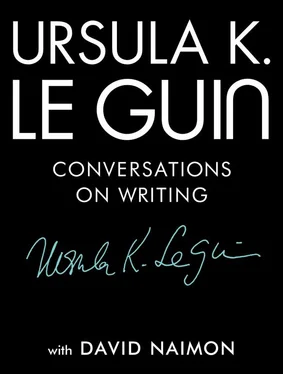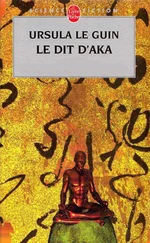DN:You also wrote the preface to Rilke’s Poems from the Book of Hours when New Directions rereleased it.
UKL:Actually The Book of Hours is not one of my favorites. I like later Rilke. He’s a very strange poet and a lot of what he says doesn’t mean much to me. But when he says things and it’s the music, even I know. My father was a German speaker, and I heard him speak German, so I know what it sounds like even if I don’t know the language. It’s the music that carries it in reality. A strange rhythm he has.
DN:Can you talk about your attraction to translating Gabriela Mistral? You dedicate one of the poems in Late in the Day to her. What was it that you fell in love with?
UKL:It was not exactly love at first sight. I didn’t know very much Spanish when I started reading her. My friend Diana Bellessi in Argentina sent me some selected Mistral and said, “You have to read this,” and so I labored into it with my Spanish dictionary and I just fell in love. I never read anything like Mistral. There isn’t anybody like Mistral, she’s very individual, and it’s an awful shame that Neruda—the other Chilean who got the Nobel—gets all the attention. But you know men tend to get the attention and you sort of struggle to keep the women in the eye of the men. Neruda is a very good poet, but Mistral just has a lot more to say to me than he does.
• • •
Muro
Muro fácil y extraordinario,
muro sin peso y sin color:
un poco de aire en el aire.
Pasan los pájaros de un sesgo,
pasa el columpio de la luz,
pasa el filo de los inviernos
como el resuello del verano;
pasan las hojas en las ráfagas
y las sombras incorporadas.
¡Pero no pasan los alientos,
pero el brazo no va a los brazos
y el pecho al pecho nunca alcanza!
Wall
Easy, extraordinary wall,
weightless wall, colorless,
a little air in the air.
Birds pass through it slantwise;
the swaying of the light,
the knife-edge of winter,
the sighs of summer pass across.
Storm-blown leaves can cross it
and embodied shadows.
But breath cannot get through,
arm cannot reach to reaching arms,
breast and breast can never meet.
DN:And what about the endeavor of translating when you come back to your own writing? Do you feel like you can trace influences from the efforts of translation?
UKL:Oh, yeah. I can trace influences from individual poets and think, “Oh, I’m trying to do Rilke here, don’t try that!” [Both laugh.]
DN:I really loved the afterword to Late in the Day entitled “Form, Free Verse, Free Form: Some Thoughts,” where you talk about your long-standing poetry group, and also about the realization you had, from doing the poetry group assignments, that form can give you a poem. By that you don’t mean to say that just by following the rules you’re going to get a poem. You mean something else.
UKL:This is touching back on that same mystery of form, rhythm, and so on. This is something that I think is clear to many poets, but I was very slow to realize it. By committing yourself to a certain form—let’s say a really complicated one, like a villanelle, which seems very artificial, and unbelievably difficult when you first approach it—certain lines are going to have to repeat themselves at certain intervals and you don’t fiddle with that. If you write a villanelle, by golly, you write a villanelle. You don’t write something like it and call it a villanelle. Take the rules seriously and somehow or other, as you follow them, you find that the necessity of having to do something gives you something to do. I don’t know how that works, and it doesn’t always work. The sonnet is probably the form most people think of when you talk about poetic form, and I find them terribly difficult. I write very, very few anymore. Maybe because there are so many very very good sonnets. I don’t know, that doesn’t usually worry me. It’s just not a form that I work with very well. The quatrain, on the other hand, is a straight form in a way—just four lines, that’s it. There’s no other definition, but you can make it just as strict as you please with rhythm and rhyme and so on. I think any artist in any medium will tell you the same thing, that if you’re working toward a certain form, whether you originated it or it’s something you inherited from other artists, you have complete freedom there. In a way, I find metric rhyming verse gives me more freedom than free verse. It’s a different kind of freedom.
DN:It reminds me of the fellowship with the pestle again, in a way. If you submit to a form, you’re also entering a conversation with a history around the form as well.
UKL:There is that, yes, and that’s exciting, although you can’t think of it while you’re writing, because that would be scary.
DN:You said in your Paris Review interview that, in fiction writing, you could also look at genre as a form, that sometimes by choosing to adopt a form in fiction, you will also discover things that you wouldn’t have otherwise.
UKL:Absolutely. I think anybody who tries to write in genre seriously, who isn’t just using it because it’s chic at the moment or they think they could do better than hack writers, they find that “Oh, I have to do it this way, so how do I do that?” There’s a sort of commitment there that makes you take it seriously. It opens up evidence to you that you would not have thought of by yourself, that the form hands over to you. But again, it’s hard to describe.
DN:I’m curious about the absence or the relative absence of science fiction and fantasy in your poetry…
UKL:I can’t put them together. There is a Science Fiction Poetry Association, and some poets that I grew up with, like Tennyson, were very good at doing a kind of science fictional poetry or putting science into their poetry. My mind apparently won’t come together there. They’re different businesses to me.
DN:In the afterword to Late in the Day , you talk about free form and free verse and how you do both. Can you talk more about free form? You mention Gerard Manley Hopkins as an example of someone taking a given form but altering it.
UKL:If you are a great enough poet you can make a curtal sonnet out of the sonnet. Sometimes I wonder about Gerard Manley Hopkins. I’ve never understood his sprung rhythm. I’ve tried and tried and tried. It doesn’t make sense to me and I’m not quite sure that a curtal sonnet is a sonnet, but it’s a lovely form. That was one of our assignments in my poetry group. I had to write one. I was terrified. [Both laugh.]
DN:I looked up the definition of a curtal sonnet and was quickly lost in the terminology of it. It is an eleven-line poem, but it consists precisely of three-fourths of the structure of a Petrarchan sonnet shrunk proportionally.
UKL:Yes. [Both laugh.] That’s kind of a complex way of doing it, but yeah, and it has this very strange short last line. The rhyming is fairly complex, and that description didn’t say that it’s also broken into six lines and then five lines. There is a break, and that is similar to the classic sonnet, which has that turning in the middle.
Читать дальше









